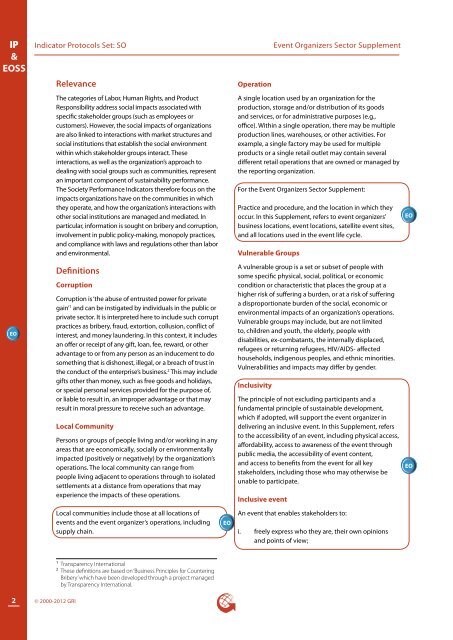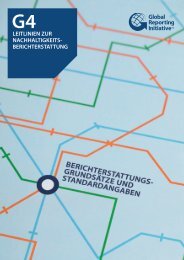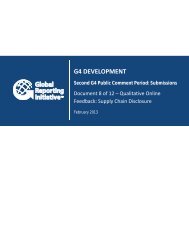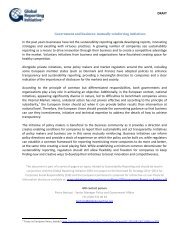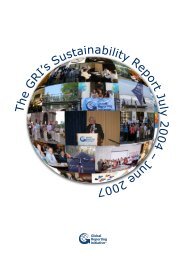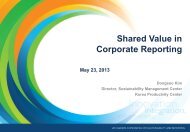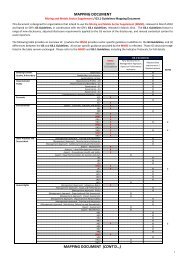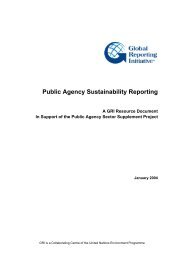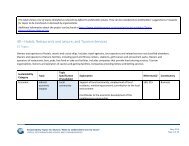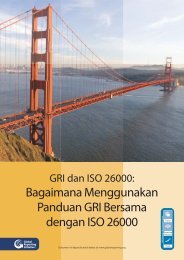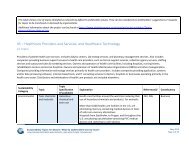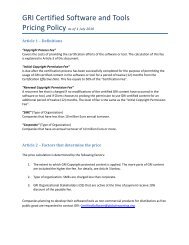Event Organizers Sector Supplement - Global Reporting Initiative
Event Organizers Sector Supplement - Global Reporting Initiative
Event Organizers Sector Supplement - Global Reporting Initiative
You also want an ePaper? Increase the reach of your titles
YUMPU automatically turns print PDFs into web optimized ePapers that Google loves.
IP<br />
&<br />
EOSS<br />
Indicator Protocols Set: SO<br />
<strong>Event</strong> <strong>Organizers</strong> <strong>Sector</strong> <strong>Supplement</strong><br />
Relevance<br />
Operation<br />
The categories of Labor, Human Rights, and Product<br />
Responsibility address social impacts associated with<br />
specific stakeholder groups (such as employees or<br />
customers). However, the social impacts of organizations<br />
are also linked to interactions with market structures and<br />
social institutions that establish the social environment<br />
within which stakeholder groups interact. These<br />
interactions, as well as the organization’s approach to<br />
dealing with social groups such as communities, represent<br />
an important component of sustainability performance.<br />
The Society Performance Indicators therefore focus on the<br />
impacts organizations have on the communities in which<br />
they operate, and how the organization’s interactions with<br />
other social institutions are managed and mediated. In<br />
particular, information is sought on bribery and corruption,<br />
involvement in public policy-making, monopoly practices,<br />
and compliance with laws and regulations other than labor<br />
and environmental.<br />
A single location used by an organization for the<br />
production, storage and/or distribution of its goods<br />
and services, or for administrative purposes (e.g.,<br />
office). Within a single operation, there may be multiple<br />
production lines, warehouses, or other activities. For<br />
example, a single factory may be used for multiple<br />
products or a single retail outlet may contain several<br />
different retail operations that are owned or managed by<br />
the reporting organization.<br />
For the <strong>Event</strong> <strong>Organizers</strong> <strong>Sector</strong> <strong>Supplement</strong>:<br />
Practice and procedure, and the location in which they<br />
occur. In this <strong>Supplement</strong>, refers to event organizers’<br />
business locations, event locations, satellite event sites,<br />
and all locations used in the event life cycle.<br />
Vulnerable Groups<br />
EO<br />
EO<br />
Definitions<br />
Corruption<br />
Corruption is ‘the abuse of entrusted power for private<br />
gain’ 1 and can be instigated by individuals in the public or<br />
private sector. It is interpreted here to include such corrupt<br />
practices as bribery, fraud, extortion, collusion, conflict of<br />
interest, and money laundering. In this context, it includes<br />
an offer or receipt of any gift, loan, fee, reward, or other<br />
advantage to or from any person as an inducement to do<br />
something that is dishonest, illegal, or a breach of trust in<br />
the conduct of the enterprise’s business. 2 This may include<br />
gifts other than money, such as free goods and holidays,<br />
or special personal services provided for the purpose of,<br />
or liable to result in, an improper advantage or that may<br />
result in moral pressure to receive such an advantage.<br />
Local Community<br />
Persons or groups of people living and/or working in any<br />
areas that are economically, socially or environmentally<br />
impacted (positively or negatively) by the organization’s<br />
operations. The local community can range from<br />
people living adjacent to operations through to isolated<br />
settlements at a distance from operations that may<br />
experience the impacts of these operations.<br />
A vulnerable group is a set or subset of people with<br />
some specific physical, social, political, or economic<br />
condition or characteristic that places the group at a<br />
higher risk of suffering a burden, or at a risk of suffering<br />
a disproportionate burden of the social, economic or<br />
environmental impacts of an organization’s operations.<br />
Vulnerable groups may include, but are not limited<br />
to, children and youth, the elderly, people with<br />
disabilities, ex-combatants, the internally displaced,<br />
refugees or returning refugees, HIV/AIDS- affected<br />
households, indigenous peoples, and ethnic minorities.<br />
Vulnerabilities and impacts may differ by gender.<br />
Inclusivity<br />
The principle of not excluding participants and a<br />
fundamental principle of sustainable development,<br />
which if adopted, will support the event organizer in<br />
delivering an inclusive event. In this <strong>Supplement</strong>, refers<br />
to the accessibility of an event, including physical access,<br />
affordability, access to awareness of the event through<br />
public media, the accessibility of event content,<br />
and access to benefits from the event for all key<br />
stakeholders, including those who may otherwise be<br />
unable to participate.<br />
Inclusive event<br />
EO<br />
Local communities include those at all locations of<br />
events and the event organizer’s operations, including<br />
supply chain.<br />
EO<br />
An event that enables stakeholders to:<br />
i. freely express who they are, their own opinions<br />
and points of view;<br />
1<br />
Transparency International<br />
2<br />
These definitions are based on ‘Business Principles for Countering<br />
Bribery’ which have been developed through a project managed<br />
by Transparency International.<br />
2<br />
© 2000-2012 GRI


